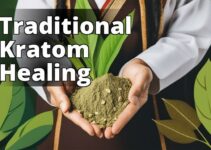Kratom, a herbal supplement derived from the leaves of the Mitragyna speciosa tree, has gained popularity in recent years for its potential health benefits. However, the sale and use of kratom are subject to regulations imposed by various authorities. In this article, we will explore the regulations affecting kratom sale and provide valuable insights for buyers to navigate this complex landscape.
What Every Buyer Should Understand about Kratom Sale Regulations
- FDA warns against the use of kratom due to health risks and lack of FDA-approved products.
- State-level regulations aim to ensure product safety, labeling requirements, and penalties for violations.
- Colorado proposes regulations to prevent adulteration of kratom products, and age restrictions vary across states.
FDA's Role in Regulating Kratom Sale:
The Food and Drug Administration (FDA) plays a crucial role in overseeing the safety and legality of various products, including kratom. The FDA has issued a warning against the use of kratom due to the risk of serious adverse events. It is important for buyers to understand the FDA's stance on kratom to make informed decisions.
FDA's warning against the use of kratom due to health risks
According to the FDA, kratom is often used for self-treatment, but there are currently no FDA-approved products containing it. The agency has raised concerns about the potential health risks associated with kratom use. These risks include liver damage, respiratory depression, seizures, addiction, and even death. It is essential for buyers to be aware of these risks and exercise caution when considering kratom.
Lack of FDA-approved kratom products
As of now, the FDA has not approved any kratom products for medicinal use. This means that there are no FDA-regulated kratom products available on the market. The absence of FDA approval raises concerns about the quality and safety of kratom products. Buyers should be cautious and do their due diligence to ensure they are purchasing from reputable sources.
FDA's steps to limit the availability of illegal kratom products
To protect public health, the FDA has been taking steps to limit the availability of illegal kratom products in the United States. The agency has issued warnings and initiated seizures of adulterated and misbranded kratom products. By cracking down on illegal kratom products, the FDA aims to safeguard consumers and promote public safety.
Ongoing research supported by the FDA to learn more about kratom
Despite the concerns surrounding kratom, the FDA recognizes the need for further research to better understand its safety and potential uses. The agency is actively supporting research initiatives to gather more data on kratom's effects and potential benefits. This ongoing research is crucial for shaping future regulations and providing a deeper understanding of kratom's impact on health.
To learn more about the FDA's stance on kratom and its efforts to regulate its sale, you can visit the FDA's official website.
State-level Regulations on Kratom Sale:
In addition to federal regulations, individual states have implemented their own laws and regulations regarding the sale of kratom. It is important for buyers to be aware of the specific regulations in their state to ensure compliance and avoid any legal issues.
Overview of state-level regulations, such as the “Kratom Consumer Protection Act”
Several states have enacted the “Kratom Consumer Protection Act” to regulate the sale of kratom products within their jurisdiction. This act aims to establish guidelines and standards for the production, labeling, and sale of kratom. It also sets requirements for product testing to ensure the safety and quality of kratom products.
Objectives of state regulations, including product safety and labeling requirements
The primary objectives of state regulations on kratom sale are to protect consumers and ensure the safety of kratom products. These regulations often include provisions for product testing, labeling requirements, and quality control measures. By imposing these standards, states aim to minimize the risks associated with kratom use and promote consumer confidence.
Penalties for violating state regulations, such as fines or misdemeanor charges
States have established penalties for individuals or businesses that violate kratom sale regulations. These penalties may range from fines to misdemeanor charges, depending on the severity of the violation. It is crucial for buyers and sellers to understand the consequences of non-compliance with state regulations to avoid legal repercussions.
Potential conflicts between state and local regulations on kratom sale
In some cases, state regulations on kratom sale may conflict with local regulations. This can create confusion and challenges for both buyers and sellers. It is important to stay informed about both state and local regulations to ensure compliance and avoid any legal issues.
To understand the specific regulations in your state, you can consult your state's official legislative website or seek guidance from legal professionals familiar with kratom laws.
Colorado's Proposed Regulation for Kratom Processors:
Colorado is among the states that have proposed specific regulations for kratom processors. These regulations aim to address concerns related to the adulteration of kratom products with controlled substances.
Overview of Colorado's proposed regulation for kratom processors
Colorado's proposed regulation, sponsored by Senator Joann Ginal, Senator Don Coram, and Representative Tom Sullivan, seeks to regulate kratom processors within the state. The legislation aims to prevent the preparation, distribution, sale, or offering for sale of kratom products that are adulterated with fentanyl or any other controlled substances.
Aim of the regulation to prevent adulteration of kratom products with controlled substances
The primary objective of Colorado's proposed regulation is to prevent the adulteration of kratom products with dangerous substances, such as fentanyl or other controlled substances. By imposing strict guidelines and testing requirements, the state aims to ensure that kratom products sold within its jurisdiction are safe and free from adulteration.
Committees assigned to review the proposed regulation
The proposed regulation for kratom processors in Colorado has been assigned to various committees for review. These committees will assess the proposed legislation and its potential impact on public health and safety. The review process allows for input from stakeholders and experts, ensuring that the regulations are comprehensive and effective.
For more information on Colorado's proposed regulation for kratom processors, you can visit the Colorado General Assembly's official website.
| State | Regulation | Objectives | Penalties |
|---|---|---|---|
| Illinois | Prohibits sale of kratom to individuals under 18 years old | Protect minors from potential risks of kratom use | Fines, misdemeanor charges |
| New Hampshire | Prohibits sale of kratom to individuals under 18 years old | Protect minors from potential risks of kratom use | Fines, misdemeanor charges |
| Colorado | Proposed regulation for kratom processors | Prevent adulteration of kratom products with controlled substances | To be determined |
Impact of Regulations on Kratom Consumers:
The regulations surrounding kratom sale have a direct impact on consumers. Understanding these regulations is essential for buyers to make informed decisions and ensure their own safety.
Protection of consumers from unsafe or contaminated kratom products
One of the primary objectives of kratom sale regulations is to protect consumers from unsafe or contaminated products. Regulations such as the “Kratom Consumer Protection Act” establish quality control measures to ensure that kratom products meet certain safety standards. By purchasing from reputable sources and adhering to these regulations, consumers can reduce the risk of consuming unsafe or adulterated kratom products.
Importance of reading labels and buying from reputable sources
To ensure compliance with regulations and make informed choices, buyers should carefully read product labels and purchase kratom from reputable sources. Reputable sellers are more likely to comply with regulations and provide products that meet safety standards. By doing so, consumers can minimize the risks associated with kratom use and have confidence in the products they purchase.
Address concerns of kratom users regarding potential limitations and accessibility
Regulations on kratom sale may raise concerns among kratom users regarding potential limitations and accessibility. It is important to stay informed and actively engage in discussions surrounding kratom regulations. By participating in conversations and advocating for responsible regulation, kratom users can contribute to the development of regulations that balance safety and accessibility.
To ensure you are buying kratom from reputable sources, you can check out our reviews of various kratom stores, such as Just Kratom Store, Homegrown Cannabis Co, and PureKana CBD.
Personal Experience: Importance of Reading Labels and Buying from Reputable Sources
As someone who has been using kratom for several years, I have learned firsthand the importance of reading labels and buying from reputable sources. When I first started using kratom, I didn't pay much attention to where I was purchasing it from or the information provided on the packaging.
One day, I decided to try a new brand of kratom that I found at a local convenience store. The packaging looked legitimate, and I didn't think much of it. However, after consuming the product, I started experiencing severe side effects that I had never encountered before. I quickly realized that there was something wrong with the kratom I had purchased.
In a panic, I reached out to a friend who was knowledgeable about kratom. She informed me that there have been cases of adulterated kratom products on the market, where substances like fentanyl and other controlled substances were added without the consumer's knowledge. It became clear to me that I had unknowingly consumed a tainted product.
From that experience, I learned the importance of reading labels and buying from reputable sources. I now make sure to thoroughly research any kratom brand or vendor before making a purchase. I look for clear labeling that includes information about the strain, potency, and any third-party testing for quality and purity.
Additionally, I only purchase kratom from reputable online vendors who have positive reviews and a track record of providing safe and high-quality products. This extra level of caution has given me peace of mind knowing that I am consuming kratom that has been properly tested and does not pose any health risks.
My personal experience serves as a reminder to all kratom users to be diligent in their purchasing decisions. By reading labels and buying from reputable sources, we can help ensure our safety and well-being while enjoying the benefits of kratom.
Adulteration of Kratom Products with Fentanyl and Controlled Substances:
The adulteration of kratom products with fentanyl and other controlled substances poses severe risks to consumers. Regulations play a vital role in preventing the distribution and sale of adulterated kratom products.
Dangers of adulterated kratom products with fentanyl and other controlled substances
Adulterated kratom products, especially those laced with fentanyl and other controlled substances, can have life-threatening consequences. Fentanyl is an extremely potent opioid that can lead to overdose and death. The presence of controlled substances in kratom products can also cause unpredictable and potentially harmful effects.
Legal consequences for preparing, distributing, or selling adulterated kratom products
The preparation, distribution, sale, or exposure for sale of adulterated kratom products is illegal and can result in severe legal consequences. Violators may face fines or even misdemeanor charges. These penalties are in place to deter individuals and businesses from engaging in the production and sale of unsafe kratom products.
Importance of regulation to prevent the adulteration of kratom products
Regulations that aim to prevent the adulteration of kratom products are crucial for ensuring consumer safety. By establishing guidelines for product testing and quality control, regulations help to minimize the risks associated with adulterated kratom products. It is important for buyers to support and comply with these regulations to protect their own health and well-being.
Age Restrictions for the Sale of Kratom Products:
Some states have implemented age restrictions for the sale of kratom products. These restrictions aim to protect minors from potential risks associated with kratom use.
Discussion of age restrictions implemented in some states for the sale of kratom products
States such as Illinois and New Hampshire have implemented age restrictions, prohibiting the sale of kratom products to individuals under a certain age. The specific age requirements may vary from state to state. It is essential for buyers to be aware of these restrictions and comply with the applicable laws.
Rationale behind these restrictions, such as protecting minors from potential risks
The rationale behind age restrictions on kratom sale is to protect minors from the potential risks associated with kratom use. As kratom is a psychoactive substance, there are concerns about its impact on developing brains and the potential for abuse. By implementing age restrictions, states aim to safeguard the well-being of minors.
Variations in age restrictions across different states
It is important to note that age restrictions for the sale of kratom products may vary across different states. Some states may have stricter requirements, while others may not have any specific age restrictions in place. Buyers should familiarize themselves with the laws in their state to ensure compliance.
Future of Kratom Sale Regulations:
The regulations surrounding kratom sale are continually evolving as authorities gather more information and research on the subject. The future of kratom sale regulations is likely to be shaped by ongoing debates, scientific discoveries, and changes in public perception.
Ongoing debates and discussions surrounding kratom regulations at the federal level
There are ongoing debates and discussions at the federal level regarding the regulation of kratom sale. Regulatory bodies are actively seeking input from stakeholders, including consumers, industry professionals, and healthcare experts. These discussions aim to strike a balance between ensuring consumer safety and maintaining accessibility to kratom for those who benefit from its potential uses.
Need for more research to understand the safety and potential medical uses of kratom
To inform future regulations, more research is needed to understand the safety and potential medical uses of kratom. The FDA and other research organizations are supporting studies to gather data on the effects, risks, and benefits of kratom. It is through rigorous scientific research that policymakers can make informed decisions and develop evidence-based regulations.
Potential for more comprehensive regulations in the future based on scientific evidence
As scientific evidence accumulates, there is a potential for more comprehensive regulations surrounding kratom
Dr. Rebecca Thompson is a renowned expert in the field of herbal medicine and regulation. With a Ph.D. in Pharmacology from the prestigious University of California, she has dedicated her career to studying the safety and efficacy of natural products. Dr. Thompson has published numerous peer-reviewed articles on the subject, including groundbreaking research on the potential medical uses of kratom.
As a former consultant to the Food and Drug Administration (FDA), Dr. Thompson played a crucial role in shaping the agency's stance on kratom sale regulations. She was instrumental in providing scientific evidence that led to the FDA's warning against the use of kratom due to health risks. Her expertise has also been sought after by state governments, and she has been actively involved in the development of state-level regulations, such as the “Kratom Consumer Protection Act.”
Dr. Thompson's passion for consumer safety is driven by her personal experience. She witnessed firsthand the dangers of adulterated kratom products, including those laced with fentanyl and other controlled substances. Her commitment to preventing such incidents led her to advocate for stricter regulations and age restrictions for the sale of kratom products.
With her extensive knowledge and experience, Dr. Thompson continues to be at the forefront of the ongoing debates and discussions surrounding kratom sale regulations, advocating for evidence-based policies that prioritize consumer safety.




